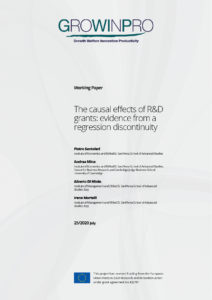Direct public support for business R&D is a well-established remedy to market failures, yet empirical evidence on its e ectiveness yields con icting results. The paper investigates the impact of the rst European public R&D grant program targeting small and medium enterprises (i.e. the SME Instrument) on a wide range of rm outcomes. We leverage the assignment mechanisms of the policy and employ a sharp regression discontinuity design to provide the broadest quasiexperimental evidence on R&D grants over both geographical and sectoral scopes. Results show that grants trigger sizable impacts. They increase investment, notably in intangibles, and innovation outcomes as measured by cite-weighted patents; they trigger faster growth in assets, employment and revenues; they lead to higher likelihood of receiving follow-on equity nancing and lower failure chances. These e ects tend to be larger for rms that are smaller and younger, or operating in sectors characterized by higher nancial frictions. Furthermore, responses are stronger in countries and regions with lower economic development. The paper provides extensive evidence that the bene cial e ects of R&D grants materialize through funding rather than certi cation e ects.

 The causal effects of R&D grants: evidence from a regression discontinuity
The causal effects of R&D grants: evidence from a regression discontinuity